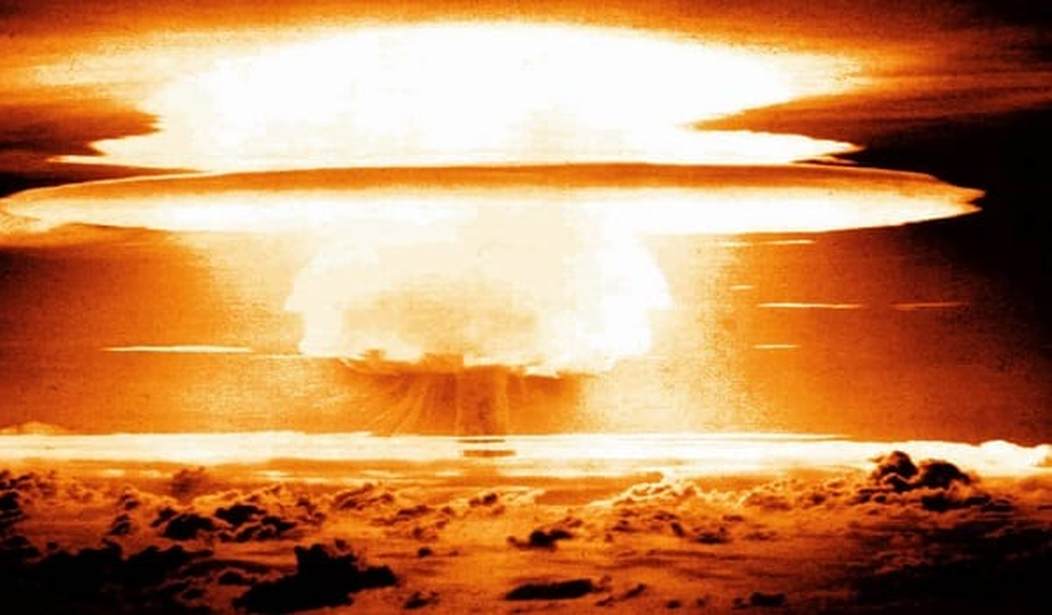65.5 million (give or take) years ago, an asteroid the size of Mount Everest slammed into the waters off what we now call the Yucatan Peninsula, exploding with the force of 100 million atomic bombs of the sort used on Hiroshima. It made a crater that was over 60 miles wide and almost 20 miles deep, which rapidly filled in with sediments, but signs of which remain, known as the Chicxulub crater. In the aftermath, around 70 percent of life on land died out, including the big, charismatic dinosaurs. In the oceans, things were worse. The planet was thousands of years in recovery, and when the impact effects finally receded, Earth was a very different place.
Here's the thing: There's no guarantee that something like this, or some other humanity-ending event, couldn't happen again. On a recent episode of Fox News' "Saturday Night," host Jimmy Failla asked the guests how they would react to such a thing.
The replies were, well, amusing.
What would you do? A comet is going to hit. We're probably going under. What is your last move? @JimmyFailla asks @justine_Brooke on @FNSaturdayNight @FoxNews pic.twitter.com/KbXdF4yyiy
— Media Research Center (@theMRC) October 27, 2025
It's an interesting question. Part of the answer, of course, might depend on what kind of event was involved. The event described above, a massive asteroid plowing into the planet, may offer some warning. But some other things might not give us that warning.
So, what could wipe our planet clean? And have they happened before?
- Asteroid/Comet strike. The Chicxulub event is the best-known impact, but there have been others, large and small. A small strike might wipe a city off the map and screw up agriculture for a few years. Another Chicxulub strike, well, if an asteroid the size of Mount Everest is predicted to strike on December 1st, don't make any Christmas plans.
- A gamma-ray burst. One of these, if it's close enough, would give no warning. Gamma rays travel at the speed of light, and a serious strike from one of these, say one within 200 light-years, could have much the same effect as placing the planet in a microwave turned to "Incinerate." So, no use in speculating what you might do here.
- Runaway volcanism. This one's rather unlikely, although a major eruption can have a global effect for a few years, like the Mount Tambora eruption. But if something like one of Earth's megavolcanoes decided to blow its top? That would be bad, and we've got one right here in North America - the Yellowstone Caldera. We should get some warning on this one. This has happened before, most notably at the end of the Permian, when the Siberian Traps went up about 252 million years ago and caused the worst mass extinction in the planet's history.
- Nuclear war. This could be really bad, but might be survivable, by a few people, cast back into prehistoric living conditions. Best to be at Ground Zero and get it over with.
- Artificial Intelligence. All of the various AI platforms we see springing up obviously aren't programmed with Asimov's Three Laws of Robotics; according to at least one report, they are closer to Skynet. And, again, this is one we may never see coming until missiles start launching themselves.
- Natural stupidity. The climate scolds, for example. Granted, they can't kill us all, but they could sure screw things up with stupid ideas, like blotting out the sun.
So, what would you do in any of these scenarios?
Read More: Stupidity on a Global Scale: UK's Government Plans to Blot Out the Sun
The Disaster That Could Destroy the West Coast: No, It's Not Climate Change
It's an interesting mind game. I can offer some suggestions for each scenario; mind you, this is what I would do. Your mileage may vary.
- Let's say we get a week's warning. Seven days hence, our world ends. Not much time to get one's affairs in order. Spend time with family, if you can. And when the moment comes, break out a lawn chair, get a glass of really good whiskey, and watch. The best place to be is probably right under the rock as it comes down. Get it over with quickly.
- Not much you can do here. If the exploding supernova is within, say, 50 light-years, you'll be fried before you can react. At 200 light-years, you might be able to feel yourself start to scorch before dying from massive cellular collapse.
- In this case, we would hopefully get at least a few days' warning. See case #1.
- There are a lot of variables here. If Russia tosses a few tactical nukes at Ukraine, or India and Pakistan exchange a few hot rocks - both scenarios that aren't impossible to imagine - the effects would be mostly local. If there's a massive exchange? Put your head between your legs, and kiss your tukhus goodbye.
- It's impossible to predict how AI could pull this off. Shut down the internet? A pain, but a survivable one. We got along very well without it, right up to the late 20th century. Launch all the missiles? See #4. Something else? Unleashing a swarm of nano-bots to reduce us all to gray sludge? It's hard to say what we could do - if anything.
- Vote for Republicans. Keep the climate scolds in check.
In plain talk, there's not too much to do about any of these possibilities. Fortunately, the odds of any given event, such as an asteroid strike or a gamma-ray burst, are pretty small. So, take an even strain; adopt the "What, Me Worry?" approach. Don't worry about it until if and when it happens. When it does, if it's a big one, adopt my approach - good whiskey and a good vantage point. May as well enjoy the show, because it would be the last one.














